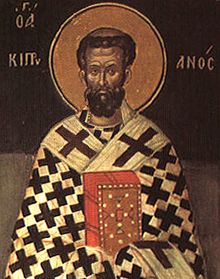
Back قبريانوس القرطاجي Arabic قبريانوس القرطاجى ARZ Cipriano de Cartago AST Kiprian Azerbaijani Кіпрыян Карфагенскі Byelorussian Киприян Картагенски Bulgarian Cebrià de Cartago Catalan Svatý Cyprián Czech Cyprianus Welsh Cyprianus Danish
Cyprian | |
|---|---|
| Bishop of Carthage | |
 | |
| See | Carthage |
| Appointed | 248 or 249 AD |
| Term ended | 14 September 258 AD |
| Predecessor | Donatus I |
| Successor | Carpophorus |
| Personal details | |
| Born | c. 210[1] |
| Died | 14 September 258 Carthage, Roman Empire |
| Sainthood | |
| Feast day | 16 September (Catholic Church, Western Rite Orthodoxy, and Lutheran) 31 August (Eastern Orthodox) 26 September (Anglican) 14 September (historical Sarum Use) |
| Venerated in | Catholic Church Oriental Orthodox Churches Eastern Orthodox Church Lutheranism Anglicanism |
| Patronage | North Africa, Berbers[3][4] |
Cyprian (/ˈsɪpriən/; Latin: Thascius Caecilius Cyprianus; ca. 210 to 14 September 258 AD[1]) was a bishop of Carthage and an early Christian writer of Berber descent, many of whose Latin works are extant. He is recognized as a saint in the Western and Eastern churches.
He was born around the beginning of the 3rd century in North Africa, perhaps at Carthage,[5] where he received a classical education. Soon after converting to Christianity, he became a bishop in 249. A controversial figure during his lifetime, his strong pastoral skills, firm conduct during the Novatianist heresy and outbreak of the Plague of Cyprian (named for his description of it), and eventual martyrdom at Carthage established his reputation and proved his sanctity in the eyes of the Church.
His skillful Latin rhetoric led to his being considered the pre-eminent Latin writer of Western Christianity until Jerome and Augustine.[6]
- ^ a b The Liturgy of the Hours according to the Roman Rite: Vol. IV. New York: Catholic Book Publishing Company, 1975. p. 1406.
- ^ Benedict XVI 2008, p. 51.
- ^ Lanzi, Fernando (2004). Saints and Their Symbols: Recognizing Saints in Art and in Popular Images. Liturgical Press. p. 80. ISBN 9780814629703.
Cyprian von Karthago. This bishop of Carthage was one of the most important saints of Christian Africa in the third century; he is patron of North Africa and the Berbers.
- ^ Dupont, Anthony (2020). The Bible in Christian North Africa: Part I: Commencement to the Confessiones of Augustine (ca. 180 to 400 CE). Walter de Gruyter GmbH & Co KG. p. 194. ISBN 9781614516491.
- ^ Chisholm, Hugh, ed. (1911). . Encyclopædia Britannica. Vol. 7 (11th ed.). Cambridge University Press. pp. 694–695.
- ^ Chapman, Henry Palmer (1908). . In Herbermann, Charles (ed.). Catholic Encyclopedia. Vol. 4. New York: Robert Appleton Company.